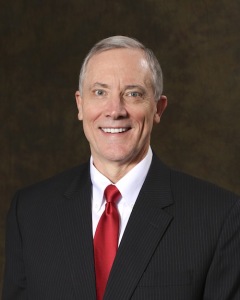Q&A with UWA president Dr. Ken Tucker
 1. When did you start at UWA and in what capacities have you served since then?
1. When did you start at UWA and in what capacities have you served since then?
Answer: I came back to UWA in January, 2007 as the Director of the Regional Center for Community and Economic Development. I became Dean of the College of Business and Professor of Management in August of 2007, and have served in that capacity until assuming the role of President on January 1, 2015. I had previously been employed at Livingston University from 1983 to 1992 as an Assistant Professor of Management, Director of the Small Business Development Center, and Director of the Center for Business and Economic Services.
2. What was the initial reaction for you when it became apparent that you would be selected as the new President of the University?
Answer: A range of emotions surfaced as you can imagine. I am, of course, deeply honored to have been selected as the next President of our great University. I also am very excited about the opportunity to work with the Board, faculty, staff, students, alumni, and other stakeholders in helping UWA grow and prosper and be the best it can be. I am very grateful for the confidence placed in me by the Search Committee and the full Board of Trustees, as well as the widespread support I have enjoyed, both internally and externally. I am also looking forward to the challenge.
3. Do you believe there will be any takeaway from your time as a Marengo County commissioner that will help you in your new role as UWA President?
Answer: I was very involved with community, economic, and workforce development activities as a county commissioner, and will continue to place emphasis on these areas since that is part of the mission of a regional university. My time as a commissioner enabled me to build a valuable network of contacts which should place me in good stead as a catalyst for community and workforce development initiatives in UWA’s market area. County commissioners, like university administrators, learn rather quickly how to effectively deal with many diverse constituencies on a broad array of topics, all for the greater good.
4. In your estimation, what are some of the major challenges that UWA is facing and how do you hope to address them?
Answer: Many universities nationwide, especially small institutions, have been experiencing a decline in enrollment of late and UWA is no exception. To combat that, we will focus on both increasing our recruiting efforts and simultaneously increasing our retention and graduation rates. On the recruiting side, we will explore developing new products, such as workforce development certificate programs and competency-based education, expanding into new markets like we have with international programs, increasing dual enrollment in the technical area as well as the academic, creating niche markets where appropriate (e.g. as we have with Teacher Connect, the military, Alabama Fire College, automotive technology, etc.), pricing competitively, investing in infrastructure and technology, and so on.
To enhance our retention efforts we will explore development of a professional retention center, growing our student success programs such as mentoring, advising, tutoring, and counseling services, increasing student quality and scholarships, ensuring current and relevant course offerings, enhancing student facilities, activities, and entertainment, and having a renewed focus on customer service. Financial stability is always a challenge as well, and whereas UWA is in excellent financial shape, we must remain vigilant in ensuring financial accountability and transparency.
5. What is your vision for the university and what do you see as the process for achieving the goals therein?
Answer: I see a bright future for UWA, and our university is well-positioned to make a meaningful difference in the lives of our students and other stakeholders in our service area and beyond. We, of course, will continue to focus on delivering quality, affordable, and accessible education, training, and services to our students and regional stakeholders.
We will also place heavy emphasis on three additional areas: growth, financial stability, and corporate culture. Growth will be achieved through renewed focus on recruiting and enrollment on the front end, and increasing retention and graduation rates on the back end, as previously discussed.
We will explore many different avenues of ensuring that we meet our fiduciary responsibilities, including operating with integrity, transparency, honesty, and accountability. We will also seek to enhance our grants and other external funding sources and evaluate additional opportunities in outreach services, executive education, skills training and development, and certificate programs. We will, of course, simultaneously look at innovative ways to increase academic programs, reduce costs, and increased efficiency and effectiveness.
To continue to enhance our corporate culture, we will concentrate on maintaining and building trustworthy relationships internally and externally, we will explore creative ways to reorganize and restructure operations to ensure continuous improvement, and so on, with the goal of building a sustainable high performance, values-driven, collegial culture exemplified by a caring, collaborative faculty, a helpful and supportive staff, and a family-oriented, safe, innovative, and respectful work environment.
6. What, if any, role do you see the university playing in overall development of the West Alabama region as a whole?
Answer: UWA is already involved in many varied community development activities, but will also place increased emphasis on workforce development and skills training, as evidenced by our $2.1 million DOL grant which is funding our applied manufacturing technology program, including certificate programs in industrial maintenance, welding, and an automotive technology partnership with Mercedes. We also look forward to expanding our excellent relationship with Shelton State Community College, especially in the technical training area. UWA is a regional university, and as such places a high priority on working with area businesses and industry to enhance job skills and improve the quality of life for all regional residents.
